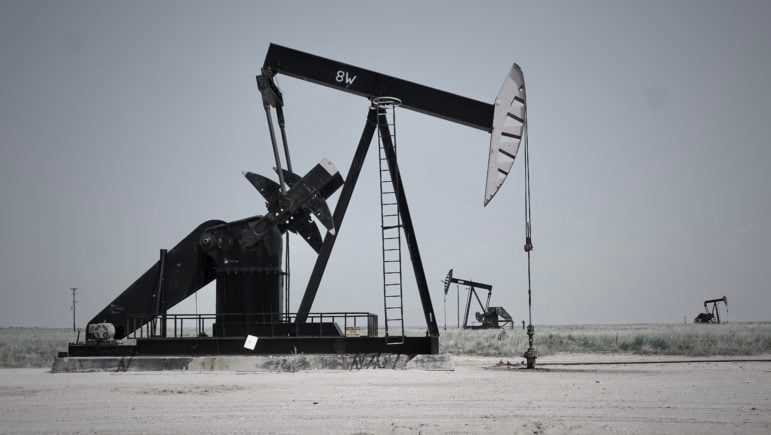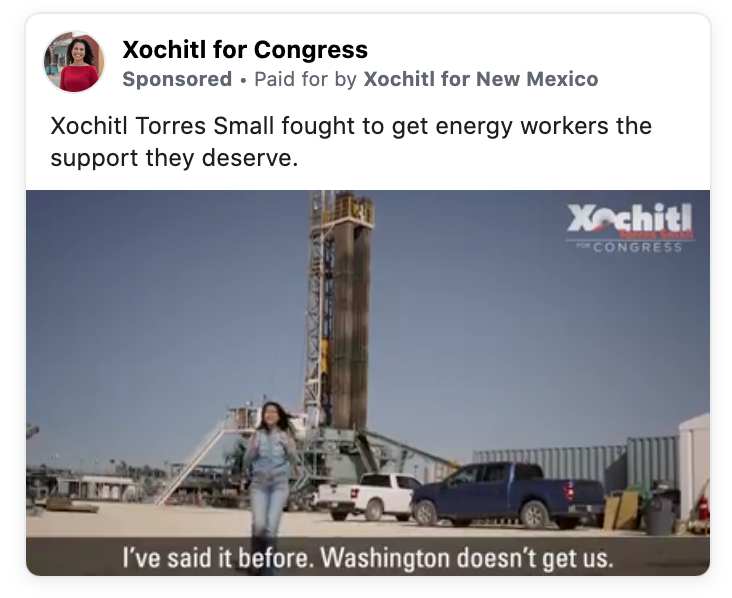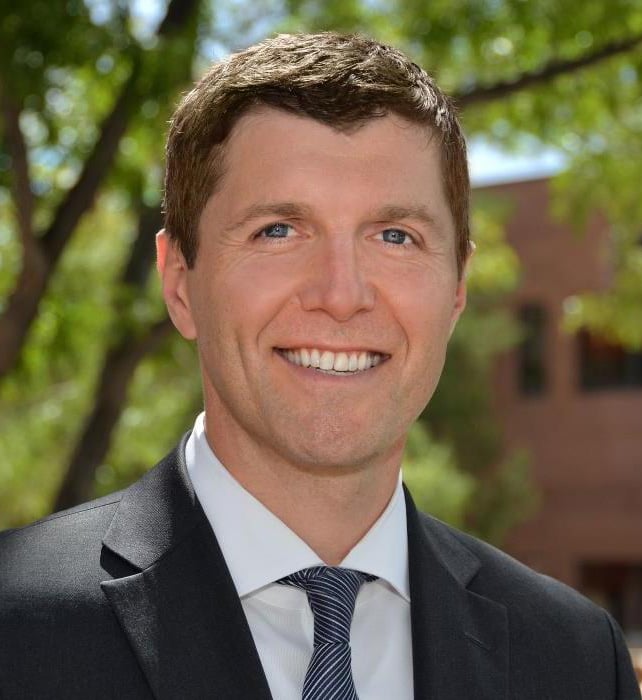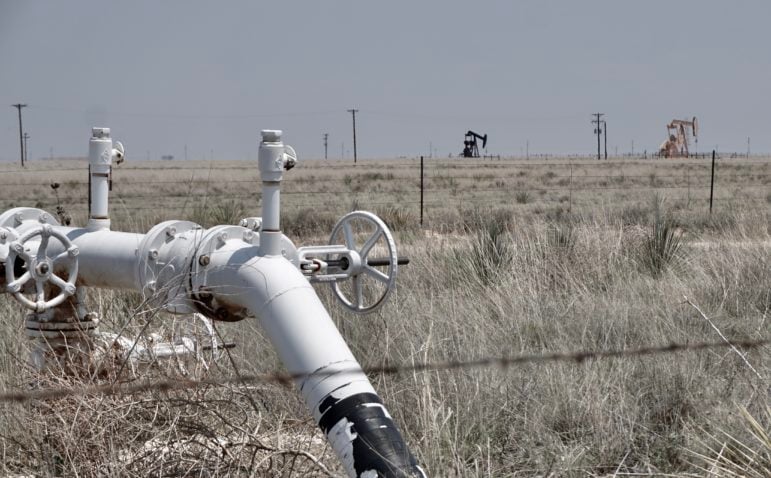
Oil and gas infrastructure on New Mexico’s eastern plains. Marjorie Childress/NMID
Dressed in denim on a windy day in front of an oil and gas rig, Xochitl Torres Small looks into the camera and says, “Washington doesn’t get us,” then tells viewers she fought to get workers the coronavirus relief they deserve.
The ad is just one of many in which Democrat Torres Small is positioning herself as an ally of oil and gas this election year as she strives to win a second term in New Mexico’s southern congressional district, one of just 26 of 435 House races across the nation declared a tossup by the respected Cook Political Report. It’s New Mexico’s most competitive high-profile contest.
Two years after Torres Small beat former Republican state lawmaker Yvette Herrell by fewer than 4,000 votes out of nearly 200,000 cast, the two women are facing off again in 2020, and Torres Small is making sure to stress her oil and gas bona fides
Oil and gas money powers the economy in the 2nd Congressional District and generations of families have come up through the oil patch in a solidly Republican swath of counties in southeast New Mexico.

Xochitl Torres Small 2020 social media ad claiming her support for oil and gas workers.
The first-term Democrat insists she would not vote to ban fracking, a drilling method that has greatly expanded U.S. fossil fuel production and flooded New Mexico with revenue before the pandemic crippled the state economy. Advocates who want to ban the procedure, which injects chemical laden water at high pressure into underground rock formations, say fracking threatens human health in addition to increasing greenhouse gas emitting fossil fuels. But industry professionals and their supporters insist it can be done safely and responsibly.
Torres Small also took to Twitter last week to call out her party’s presidential nominee, tweeting it was wrong to “demonize” one industry in the fight against climate change after Joe Biden said he’d work to transition to an economy based on renewable energy and away from the current oil economy.
Her efforts to trumpet her support of oil and gas come at a time when the industry itself is in turmoil and internal tensions between larger companies and their smaller New Mexico-based counterparts are bursting into the open, particularly over how to talk about Torres Small and her record.
Ryan Flynn, executive director of the New Mexico Oil and Gas Association, whose board of directors is dominated by out-of-state oil producers, told the Associated Press in August that Torres Small has been a “strong advocate for our state’s energy interests.”
Flynn’s comment ignited a mini-firestorm among Republican loyalists.
New Mexico Republican Party Chairman Steve Pearce, a former congressman in the southern district who made a fortune selling his oil field services company, condemned Flynn’s statement. In an op-ed for New Mexico newspapers he and the Legislature’s top two GOP lawmakers — House Minority Leader Jim Townsend, R-Artesia, and Senate Minority Leader Stuart Ingle, R-Portales — called on the NMOGA Board of Directors to replace Flynn. Flynn was turning the group into a “highly charged” political organization that worked on behalf of large oil producers rather than smaller New Mexico based companies, they wrote.
A separate letter to the NMOGA Board — spearheaded by Mark Murphy, President of Strata Production Company and signed by 12 other New Mexico oil producers— went a step further, saying Flynn’s comments represented an attempt to sabotage Herrell’s candidacy and fundraising efforts and demanded the board replace Flynn.
The NMOGA Board would stand by Flynn, issuing a statement of support that included a commitment to “continue to work with federal, state and local leaders, regardless of their political affiliation.”
As for Torres Small, Flynn doesn’t back down. “She has been a strong advocate of our industry’s interests and I stand by the statement,” he told New Mexico In Depth.
Navigating a challenging environment
In October 2017, Ryan Flynn took the podium at NMOGA’s 89th Annual Meeting, addressing a crowd at the Eldorado Hotel in Santa Fe. Declaring that NMOGA was “going to become the most powerful organization in the state again,” Flynn noted after seven years of not having to worry about regulation from Republican Governor Susana Martinez’s administration, an election was looming. He outlined a strategy centered around aggressive public engagement, combating “anti-industry rhetoric,” and a strong commitment to bipartisanship.
“We cannot tie ourselves to a single political party,” Flynn said at the time. “We have too much at stake to allow ourselves to be shifting back and forth when the state’s political landscape changes.”

Executive Director of New Mexico Oil and Gas Association Ryan Flynn
Since then, with Democratic Gov. Michelle Lujan Grisham taking over from Martinez in 2019, Flynn has continued to say the industry needs to heed the concerns of constituencies whose goals don’t fit comfortably with the Republican party’s base.
This summer, according to audio leaked and reported by the New York Times, he is heard cautioning a group of oil industry lobbyists that environmental stewardship is top of mind for young, female, Hispanic voters, the same demographic as Xochitl Torres Small. In a follow-up interview with the Times, Flynn said addressing concerns about climate change is critical to the industry’s future.
Flynn has backed his words with action. In December 2019 NMOGA made a $25,000 direct donation to the leadership fund of Democratic House Speaker Brian Egolf — a decision that angered some producers enough to warrant mention in Murphy’s August 10 letter demanding Flynn’s termination. The authors said “this money then gets funneled into the campaigns of other far-left candidates who are unfriendly to oil and gas.”
Asked about these contributions, Flynn explained they were part of NMOGA’s nonpartisan approach.
“We engage with government in New Mexico,” he told New Mexico In Depth. “And so we’re going to engage with Democrats, Republicans, Libertarians, Green Party candidates. If you’re a policymaker in New Mexico, and you want to engage on issues impacting the oil and gas industry, then we want to talk to you.”
Bi-partisanship or appeasement?
His critics equate Flynn’s approach to short-sighted appeasement.
“I think it’s very important for NMOGA, or Independent Petroleum Association, or whomever to attempt to get along, to offer rational suggestions,” said Harvey Yates, President of the Jalapeno Corporation and former state GOP party chairman. “But that doesn’t mean that you attempt to buy goodwill by [making] donations and so forth.” Yates, a member of the Yates oil family, signed Murphy’s letter demanding Flynn be replaced.
Pearce and Murphy share Yates’ opinion.
“When your friends in the industry leave you and forget who they’re supporting and who provides them the political capital for them to operate on, then it’s time for you to call your friends on the carpet,” Pearce said during an August episode of his weekly radio show, Inside New Mexico.
“I don’t believe that you can appease people that want to destroy your industry,” Murphy said on the same episode.
Both Murphy and Pearce said NMOGA’s cautious, play-both-sides strategy helps large, out-of-state oil producers that can afford to bear regulations at the expense of smaller, in-state producers.
“The big people will support regulatory things they know the small people can’t, and so eventually it chokes the small people out of business,” Pearce said in an interview.
“Flynn has staffed that board– 80% of them are large, publicly-held companies headquartered outside of New Mexico. Very little representation by the independents,” said Murphy.
Flynn, however, disagreed, saying the NMOGA Board is “as diverse as the industry that we represent.” He also defended the role that major oil companies play in boosting New Mexico’s economy.
Last year, the oil and gas industry added $16.6 billion to the economy, he said, and the overwhelming majority of that economic value came from the largest producers who are heavily invested in New Mexico.
But just seven of around 25 members of NMOGA’s Board are based in New Mexico, a review of the membership shows. The current Chair of the Board is Scott Kidwell, a vice president of Midland-based Concho Resources, which multinational Houston-based ConocoPhillips announced earlier this month it was purchasing for $9.7 billion. Other out-of-state heavyweights include representatives of Chevron, Marathon, Occidental, Exxon Mobil, and ConocoPhillips.
Still, at least one local producer on NMOGA’s board seemed satisfied with Flynn’s approach. Mark Veteto, president of Me-Tex Oil and Gas, said Democrats in the Roundhouse haven’t been as antagonistic towards the industry as Republicans make them out to be.
“If you look at the last sessions, where Brian [Egolf] has been Speaker of the House, there’s been no bill to ban fracking that has hit the floor. Imagine that! There was a bill drafted, it went to some committee— the janitorial committee, I think — and he did that intentionally,” said Veteto. “It died in committee and that was that.”
“These Democrats aren’t stupid. There’s 7 billion reasons to like oil and gas in New Mexico,” Veteto said, referring to the important role oil and gas plays in propping up New Mexico’s state budget. “Murphy and Pearce want to present this picture that it’s horrible, and if we don’t get rules and regulations that give us some breathing room, we’re gonna go out of business. Well, it’s not true. We’re slowly coming back.”
Economic stress

Oil and gas infrastructure on New Mexico’s eastern plains. Marjorie Childress/NMID
Clark Williams-Derry, an energy finance analyst at the Institute for Energy Economics and Financial Analysis, viewed the divisions as a consequence of economic stress upon the industry “that wasn’t true a decade ago.”
“Different companies are taking wildly different strategies in an industry that used to be marching pretty much in lockstep,” Williams-Derry said.
While dismissing the idea that major oil producers are trying to put smaller producers out of business, he acknowledged a large producers’ needs and interests differ from their smaller counterparts’.
“[Major oil producers] have more financial stability than the smaller producers, I think that’s a big part of it,” he said. “They may have the ability to take a long-term view of issues, whereas at a time like right now, some of the smaller independents are just fighting for survival.”
“This is happening all over the place now,” said Williams-Derry. “As the industry sinks lower into financial stress, I think we’re going to start seeing more and more cases of ugly politics, and this seems to be one of those cases.”
In a state like New Mexico, where Democrats have dominated the state legislature for decades, NMOGA’s approach is typical of an industry group seeking access to legislators to advance their interests. Yet some worry the group’s strategy may become less tenable as the Democratic Party grows more liberal on environmental issues.
“The progressive Democrats especially have taken over the party, and that party fully intends to do away with oil and gas. Take a look at the New Mexico version of the Green New Deal. They’re going to ban oil and gas in the future,” said Pearce, referring to the Energy Transition Act of 2019. “My perception is that you ought to be supporting the other party, who’s fighting against those kinds of policies, because they’re the ones who are fighting for your industry.”
Yet with New Mexico increasingly trending Democratic, that may not be a winning strategy for NMOGA.
“Traditionally, the industry has been viewed as being just, you know, completely tied to the Republican Party,” said Flynn. “And I don’t think that kind of stereotype of the industry or historical view of the industry accurately reflects the industry itself today.”
Veteto, for his part, even appears to be ambivalent about his own party’s nominee in southern New Mexico.
“If she’s elected, I think she’ll do a good job, whatever. But she’s not of the [oil and gas] industry,” said Veteto, who donated $25,000 in April to a super PAC supporting Herrell’s primary opponent, former NMOGA chair Claire Chase.
“I think Xochitl’s done a pretty decent job. I didn’t like her supporting impeaching the president. I didn’t like her supporting the Speaker of the House. But I think she’s done a reasonable job. She’s a moderate.”
As for Flynn, he says that he and NMOGA are standing firm.
“We have no intention of changing our approach.”
Regardless of the rhetoric and campaign contributions to powerful Democrats, the oil and gas industry still pumps major money into Republican campaigns.
According to an analysis by the nonprofit good government group New Mexico Ethics Watch, the industry distributed almost $1.2 million between June 30 and October 5 to candidates and political committees in New Mexico state races. Chevron Corporation contributed about a third, at $388,000, continuing an ongoing trend of pumping major amounts of cash into New Mexico political races.
“As is obvious with every round of campaign finance reports, the oil and gas industry is not shy about flexing its financial muscles in this state,” Kathleen Sabo, executive director of New Mexico Ethics Watch, said in a press release.
More than 60% of the industry cash went to Republicans, according to the group’s analysis.
As to the quest for the southern New Mexico congressional seat, the Center for Responsive Politics reports the energy sector accounts for about 10% of Yvette Herrell’s campaign cash.
Torres Small has sworn off accepting corporate cash. But Flynn’s affirmation that she’s a friend to the industry is probably just as valuable.